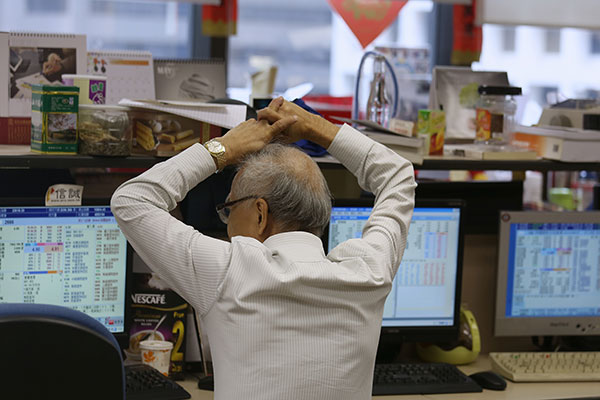|
 |
|
An investor checks share prices at a securities brokerage in Hong Kong, on Wednesday. The Hang Seng Index fell by 1,458.75 points, the biggest decline in seven years. [Photo/China Daily] |
Huge across-the-board declines seen in most of the equities after big increase in short sales
Share prices nosedived in Hong Kong on Wednesday amid rampant short sales from mainland investors, and foreign hedge funds joined the sell-off fray.
According to experts, the Hong Kong market is caught in a tight bear grip that does not show any indication of an immediate easing.
The Hang Seng Index, the capital market benchmark for the city, plummeted by 5.84 percent or by 1,458.75 points to close at 23,516.56 on Wednesday, the biggest single-day loss since November 2008. The gauge fell by as much as 8.56 percent or more than 2,100 points during the afternoon session. Turnover on the bourse reached HK$236 billion ($30.44 billion), 148 percent higher than the 30-day average.
Leading the market slump were most of the Hong Kong-listed mainland companies. The Hang Seng China Enterprises Index and Hang Seng China-Affiliated Corporations Index fell by 6.09 percent and 6.97 percent, respectively.
During the first three days of this week, the Hang Seng Index retreated by 9.77 percent, or nearly 2,550 points, to hit the lowest level since Jan 6. The benchmark is now 17.29 percent beneath its previous peak of 28,433 at the end of April.
The decline in Hong Kong mirrored the trend seen on mainland bourses. The mainland equities, known as A shares, have tumbled by more than 30 percent since the bearish trend began in mid-June.
In a previous report, Hong Hao, managing director for research at BOCOM International Ltd in Hong Kong, said mainland investors, eager to hedge their A-share positions in a market with affluent liquidity, triggered the decline in Hong Kong equities.
Peter So, managing director and co-head of research of CCB International Securities Ltd, said: "In order to offset the losses in A shares, many cross-border investors have been short selling index futures in Hong Kong. The resultant pile up has exerted downward pressure on the HSI and will make the collapse steeper during margin calls."
To arrest the market slide, the China Financial Futures Exchange said on Monday that investors can trade no more than 1,200 new futures contracts linked to the CSI 500 Index, the benchmark of small-cap A shares, every day starting Tuesday. The index futures are considered as good hedges against the losses due to the market turmoil.
Simultaneously, many investors were also forced to sell their Hong Kong shares to pay margin debts on the mainland, because their A shares were locked up. More than 1,200 stocks suspended trading on Wednesday, equal to about 40 percent of companies listed in the A-share market. Nearly 1,000 stocks fell to the daily limit of 10 percent.
Francis Cheung, managing director of China strategy at brokerage firm CLSA Ltd, said foreign hedge funds have also joined the sell-off.
"I would have shorted the Hong Kong market, given that the valuation is not cheap. While the correction demonstrates foreign investors' concern over the mainland markets, Hong Kong's fundamentals are also weak. Now we are flat compared with the beginning of this year," said Cheung.
However, it is still too early to forecast the floor of this round of correction, So from CCB International said. "A-share investors have been panicking and behaving in an irrational manner. Though the market could rebound after overshooting, it is better to wait and see for the time being."
